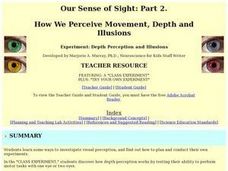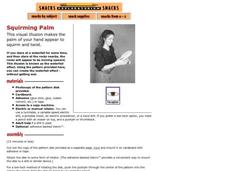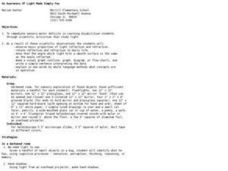Curated OER
How We Perceive Movement, Depth and Illusions
Middle schoolers examine how depth perception works through a class experiment. They design and perform their own experiment that investigates visual illusions.
Exploratorium
Squirming Palm
You will need an electric drill and some Velcro™ in order to have this activity available for your class. It is, however, an intriguing display of optical illusion. After watching a spinning disk (provided), viewers look at one of...
Exploratorium
Depth Spinner
Put a new twist on your collection of optical illusion activities. Affix the linked printable spiral to a drill, record player, or some other rotating tool. Have learners stare at the spinning disk for only 15 seconds and then look away....
University of Minnesota
Beautiful Brain: Do You See What I See?
Can art play tricks on your eyes, and can a still painting really appear to vibrate? The second lesson in a four-part series discusses the way our beautiful brains translate visual images. It highlights the style of optical art and...
Curated OER
Benham's Disk
Seeing is believing! Or is it? With this simple experiment, young scientists can explore the concept of visual perception. Attach Benham's disk to a rotating appliance such as a hand drill; As it spins, the black lines appear to be...
Curated OER
Applied Science - Science and Math Post-Lab
Students explore optical illusions. In this Applied Science lesson, students view optical illusions and record the data of what they see. Students graph the data that they collect.
LABScI
Vision Lab: The Eye
Our bodies have some amazing capabilities, but there are some limitations. Explore the limitations of the human eye through the eighth lab activity in a series of 12 biology lessons. Individuals measure their own peripheral vision...
Curated OER
Perception is not Always Reality
Seventh graders explore explanations of natural illusions. In this perception lesson plan students solve a problem by applying the process of science.
Curated OER
Perception is Not Always Reality
Students view various types of illusions. Using one of the illusions, they try to determine how a scientist might explain them. They discover a t-illusion and use their own words to analyze them. In groups, they research a different...
Curated OER
What is Retrograde Motion
In this retrograde motion worksheet, students draw a diagram of the night sky by connecting dots to show retrograde motion. They compare retrograde motion to an optical illusion and answer questions about both.
Curated OER
An Awareness of Light Made Simply Fun
Learners with sensory perception issues discover the properties of light through a series of excellent hands on activities. They look at beams of lights in a darkened room; use a kaleidoscope and optical illusions as they experience the...
Curated OER
Snakes: Illusions in Locomotion
Students learn how snakes move. In this locomotion lesson, students learn the four main methods of locomotion that snakes use. Students visually create one locomotive movement.
Desert Discoveries
Conservation Cartoons
Third graders read and create cartoons about endangered and threatened species of plants. Pupils are split up into groups. They each consider a conservation cartoon and attempt to decipher its meaning. They must decide if they agree or...
Curated OER
Now You See It, Now You Don't
Students determine their eye's blind spot. In this biology lesson, students explain what causes this visual deficiency. They give real life applications of this concept.
Curated OER
How We See
Students study how images they see are transmitted to the brain. In this sight lesson students complete several activities that have to do with visual pathways and field defects.
Curated OER
Natural Beauty: Looking Sharp
Students create covers for their "nature journals" using watercolor techniques and the artistic ideas of color, depth, and focal point. This lesson can be used in the Science or Art classroom and meets national standards for both.
Curated OER
The Eye and Color Images
Students study the eye. In this biology lesson plan, students observe and experiment with visual images as they learn about the basic parts of the eye. Students also demonstrate how an image is projected upon the retinal network.
Curated OER
Mystery of the Senses-Vision
Students view six optical illusions and explain why the visual system might interpret them the way it does. They explore how illusions distort our sense of perspective, because they deceive us into seeing what we expect to see. ...
Curated OER
Perception And The Interpretation of Experiences
Students describe a problem and propose alternative strategies for the solution. They use a model or drawing to visualize the solution to a problem. Students identify alternative factors to be considered when examining possible...
Curated OER
The Biggest Plates on Earth
The best part about teaching guides is all the great information you can use to inform your class. They infer what type of boundary exists between two tectonic plates. Then, using given information on earthquakes and volcanism they'll...
Curated OER
Perception and the Brain
Students experience how the brain adapts over time to changes in what they perceive. In this human perception lesson, students wear special prism goggles that initially disorient the user. Over time, the student is able to adjust to the...
Curated OER
Capturing Light: The Science of Photography
Young scholars explore light, and how it travels in straight path, recognize that light-sensitive chemical processes can be used to create images using light as catalyst, discover that light can be refracted by convex lens to focus...
Curated OER
Into the Sea
Students display an awareness of the diversity of species in the coral reef, their habitat and adaptations. They conduct research to find and then color code the locations of coral reefs around the world.
Other
Ritsumeikan University: Akiyoshi's Illusion Pages
A large collection of visual illusions and anomalous motion illusions. The latter can potentially make a person feel dizzy and should be viewed or shared with caution.

























